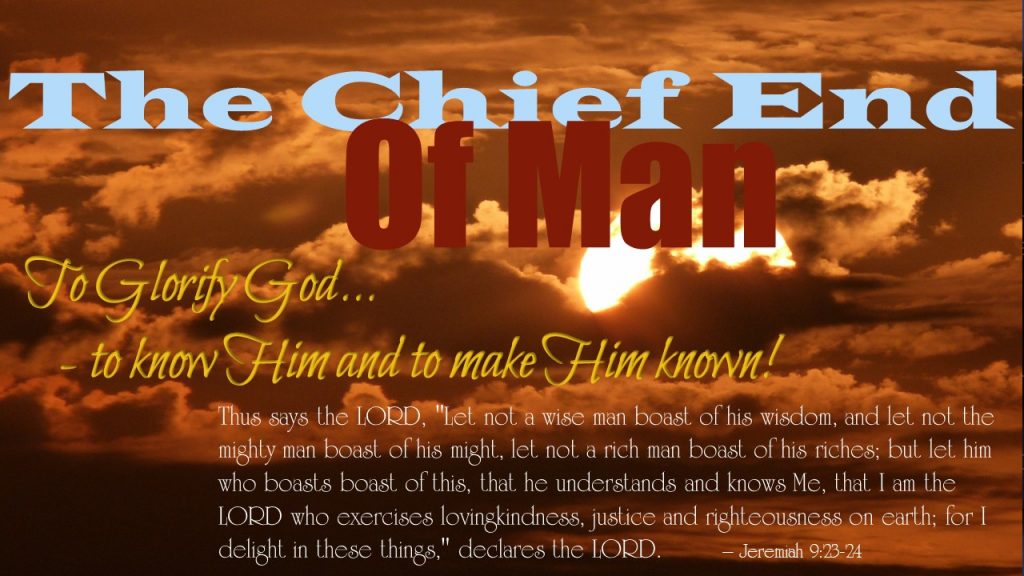
What is Man?
Today we are part of a civilization that raises its fist up against the One True God. The vitriol and violence that consumes this generation is a tragedy of epic proportion. Thinking just of our own country, America sinks under the weight of indulgence in unlimited pleasures including sex![]() and drugs, a blind enthusiasm or ignorance for horrible moral failures such as abortion and homosexuality, and the individual hedonism that drives our society’s psyche.
and drugs, a blind enthusiasm or ignorance for horrible moral failures such as abortion and homosexuality, and the individual hedonism that drives our society’s psyche.
 It is sobering to be living in that context today as we consider the work of our sovereign God bringing the worlds into existence and then placing man here as the great and gleaming capstone of His creative work. It’s as if we aren’t reading the text right when He declares us to be in His image! The plan was for us to be an unlimited source of delight and relationship for eternity. What happened?
It is sobering to be living in that context today as we consider the work of our sovereign God bringing the worlds into existence and then placing man here as the great and gleaming capstone of His creative work. It’s as if we aren’t reading the text right when He declares us to be in His image! The plan was for us to be an unlimited source of delight and relationship for eternity. What happened?
David expresses that wonder in Psalm 8 — “O LORD, our Lord, How majestic is Your name in all the earth, Who have displayed Your splendor above the heavens!” That reminds us that even despite our failings, God intends to crown us with glory and enable us to exercise dominion over the world. We do bend under the weight of that challenge, but it is still our birthright (in Christ) to go to and fro on the earth expressing the greatness of His glory. “When I consider Your heavens, the work of Your fingers, The moon and the stars, which You have ordained; What is man that You take thought of him, And the son of man that You care for him?”
David asks the tough question in Psa. 8:4: “What is man?” In the end, what do we amount to? What is every man and woman’s primary mission on earth? The answer to that profound question, as stated in the Westminster Shorter Catechism is that “the chief end of man” is to “glorify God and enjoy Him forever”. In 1 Cor. 10:31, we are told “Whether, then, you eat or drink or whatever you do, do all to the glory of God.” Copy the graphic at the bottom of this page and use it as a computer wallpaper to remind you of this grand declaration. To Glorify God means to express, ascribe, declare, demonstrate His glory. He already is all that He shall be, we don’t somehow add to His character by glorifying Him. We are just, in the highest sense possible, “stating the obvious”.
Please pause here and open your Bible and read through Genesis 2-3 in one sitting before you continue on through this Bible Study.

The Greatness of God’s Creation
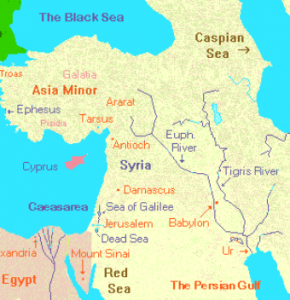 Gen. 2:10-17 – This next paragraph in Genesis is dedicated to this amazing place called Paradise or the Garden of Eden. This one place was like a microcosm of all that is expressed by God’s creative power. He provided for man’s every need and embellished it with the beauty of the natural creation.
Gen. 2:10-17 – This next paragraph in Genesis is dedicated to this amazing place called Paradise or the Garden of Eden. This one place was like a microcosm of all that is expressed by God’s creative power. He provided for man’s every need and embellished it with the beauty of the natural creation.
From Eden, one river became the source of three more, perhaps originally in what is now eastern Turkey. The present tense allows that the four rivers may have still existed in Moses’ time, and perhaps Eden as well. Note the rivers on the map, although there is much uncertainty about their actual locations. The Pishon is possibly near Arabia/Havilah – the Gihon is possibly the pre-flood Nile, as Cush usually refers to Ethiopia – and the Tigris & Euphrates are associated with Babylon.
![]() Bible Study Journal
Bible Study Journal
Here are 4 additional great passages that help our understanding of God’s creative work. Make some notes for each passage in your Journal.
The High Point of Creation
- Image – By God making Man in His image, we are self-conscious, we have personality, cognition, creativity, love, and our soul will exist eternally.
- Being in God’s image can’t refer to our actual body, since God is spirit – but in our human form, we mirror the tripartite makeup of God.
- We communicate with intelligence and logic, unique among all the earth’s creatures, just as God is a communicator – e.g. John 1:1, “…in the beginning was the Word.”
- We have an insatiable desire to create and procreate.

- We have Reason, rational thought.
- We have the desire and capacity to commune with God, aspire holiness and spiritual understanding (Job 32:8), functional conscience (Prov 20:27).
- Life
- Hebrew “ruoc”, meaning “wind”, “spirit” – this is an “anthropomorphism”, God is spirit but sometimes expresses Himself with physical characteristics to help us understand. This is similar to the reference in 2 Tim. 3:16 where God “breathed Himself into” (“inspired) the Scriptures.
- The spiritual work in the physical body of Adam, putting oxygen in the lungs, started his heart pumping, all of the body’s parts working in harmony, all as a result of the “breath of life“, that is “breathed in life”, expressed by “nephesh” which we translate as “breath” – this Hebrew word is also used for “life” being in the blood (Leviticus 17:11).
- Relationship
- Most importantly, God created Man for relationship, in order to be able to share the wonders of His creation with another person
- In his unconfirmed holiness, Man was able to “walk in the Garden. From the way Gen. 3:8 is worded, it seems that it was God’s habit to come to the Garden to fellowship with Man. The inference of intimate friendship allows for some amount of time to have passed since Adam and Eve’s creation.
- The tragedy of sin is underscored by this intimate aspect of God’s relationship to the capstone of all His creative work. Considering all the beauty and complexity of creation across all the universe, Man was the pinnacle, the point at which God’s focus rested. It was Man that He sought out for personal interaction.
A Transition to Man’s History

- Genesis 2:4 – With the word “account” (NAS) or “generations” (KJV), Moses uses the rather common Hebrew word “toledoth” for the first of at least 10 distinctive times in Genesis to express a move forward in man’s history – actually in this instance it is uniquely a move from the chronology of creation to the history of man himself – the first major transition in Genesis – the word means “this is the history of…” or, “what became of.…“
- Moses used this term to introduce new sections throughout Genesis, as a major structural indicator for the book, often related to God’s blessing & cursing. We will note these other sections as we go through Genesis.
![]() Bible Study Journal
Bible Study Journal
Take a few minutes to look at each of these references in Genesis. In your Bible Study Journal, note for each passage what the transition is “from” and “to”:
2:4; 5:1; 6:9; 10:1; 11:10, 27; 25:12, 19; 36:1 (9); 37:2
The Accounts of Man’s Creation & Fall
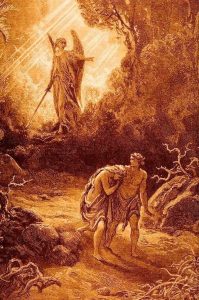 There are many ways that we observe unique grammatical “devices” in the Bible’s Old Testament. One very interesting such device is called a “chiasm”, which is used several times in the Bible. In Genesis 2:4-3:24, we have a great example of this writing emphasis. It really is an emphasis, since God inspired Moses to make this content stand out in a special way.
There are many ways that we observe unique grammatical “devices” in the Bible’s Old Testament. One very interesting such device is called a “chiasm”, which is used several times in the Bible. In Genesis 2:4-3:24, we have a great example of this writing emphasis. It really is an emphasis, since God inspired Moses to make this content stand out in a special way.
This major passage takes us through the accounts of Man’s creation and his fall. The “chiastic” symmetry of the content is expressed with cascading points which are stated in an initial form, and then repeated in a reverse parallel format.
The segments of the passage are presented in a logical forward manner, then repeated in reverse, which produces a “mirror” effect; each point is reflected in its “mirror” point with a word or concept; this structure is a great illustration of the richness & complexity of God’s Word, and serves to emphasize the strategic importance of the events.
A chiastic passage is generally pictured as shown in this graphic:
Here is an explanation of how the chiasm works in this passage:

The Tradition of History
Moses lived around 1500 BC. See the timeline at the bottom of this study to have an idea of the lifespans and relationships of key people in Genesis. In Gen. 17:14, the Lord said to Moses, “write this in a book”. It would seem that God had already been in the process of revealing to Moses much of the information that we read in Gen. 1-11, likely with a dependency on oral tradition. For example, Methuselah and Lamech would have heard stories from the beginning from Adam in person. Then, Abraham would have heard this developing history from them. Look at God’s words to Moses in Exo. 34:1, 27, “the LORD said to Moses… I will write on the tablets… Write down these words, for in accordance with these words I have made a covenant with you.” Think of the processes that God enabled for all of man’s history to be communicated to Moses, by word and written form.
J. Vernon McGee said that Genesis is the “seed plot” of the Bible. From it, the history of God’s dealings develop:
- The Pentateuch as a whole is what Moses experienced leading the nation.
- The necessary prologue for the four remaining books of the Pentateuch is Genesis – especially Gen 1-11 – then the Patriarchal age begins
- His people needed to know their Sovereign God and understand the great works He accomplished before them
- The “Primary divide” of the book is Gen.12
Use this outline of Genesis to think through what is being taught as you read through the book.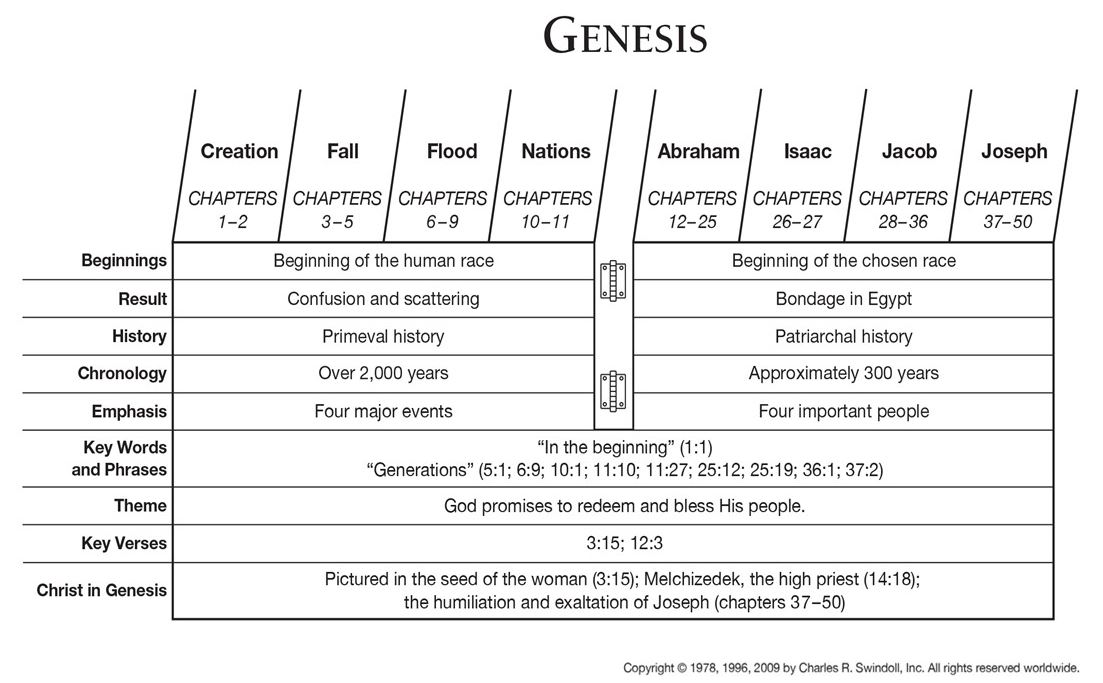
Where is the emphasis of the book: chapters 1-11, or 12-50?
- The first 11 chapters cover 1800 years which amounts to about 29% of total world history.
- Then Gen. 12-50 covers just 300+ yrs, which is just 3% of man’s history.
- Conclusion: God slowed down the Genesis narrative and gave much more detailed history once His covenant with Abraham and His commitment to His people Israel is declared.
Genesis Timeline
It is helpful to see the timeline shown below in order to appreciate the interwoven lives of people who lived much longer than we do today.
- Note who is living while Adam was still alive
- Note who is alive when Noah is alive
We can begin to appreciate how the true history of man from Adam’s day into Moses’ lifetime began to be understood.
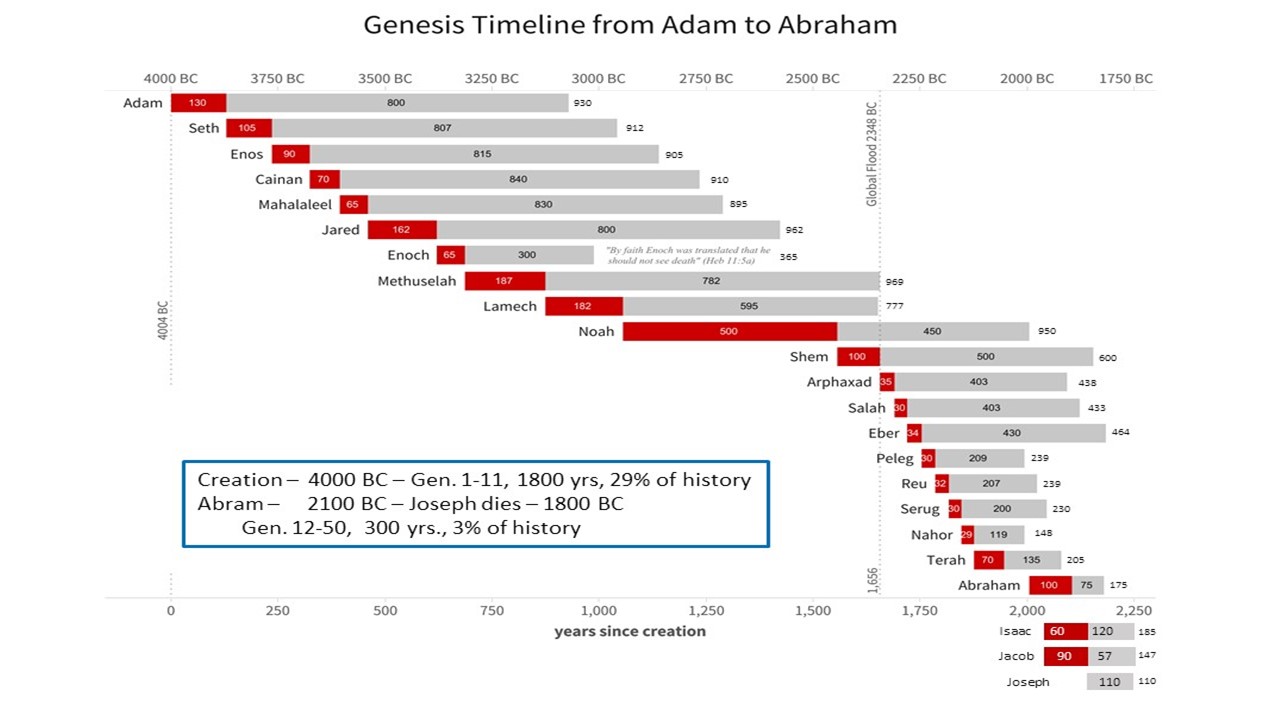
![]() Bible Study Journal
Bible Study Journal
-
-
- Why was Adam & Eve put in the Garden?
- How did God know Adam needed a wife?
- Why did God make Adam work in the Garden?
- How did work change when they were sent out of the Garden?
- Why did God allow the possibility of disobeying?
- In Gen.3, why were Adam & Eve tempted?
- How is this temptation similar to Satan tempting Jesus in Matt. 4?
- What broke their relationship with God?
- Do people today face temptation they can’t handle (see James 1)?
- When you fail to stay faithful in obedience, do you hide from God? If not, what should you do?
-

